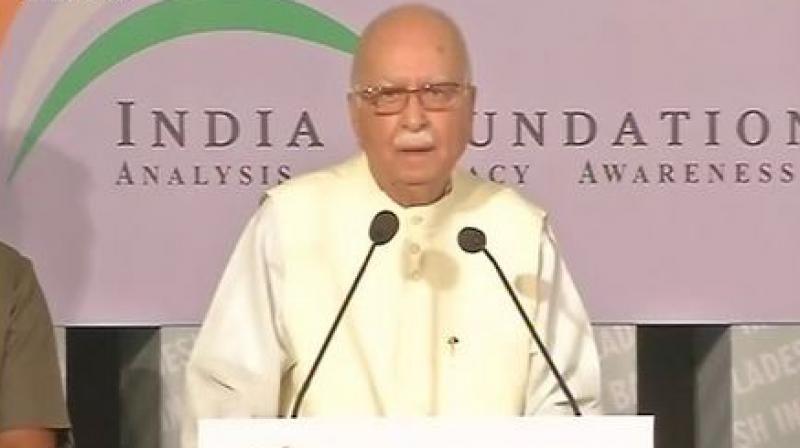Political Gup-Shup: Bharat Ratna for Advani?
Mr Advani's detractors maintain that it will be difficult to confer the award on him till he is cleared of the charges.

The BJP appears to be blowing hot and cold as far as its veteran leader L.K. Advani is concerned. Already sidelined after the Narendra Modi-Amit Shah duo took control of the party three years ago, the BJP-led government then went a step further and gave permission to the CBI to frame criminal conspiracy charges against Mr Advani and other party leaders for the demolition of the Babri Masjid. But lately, there is talk in the BJP that it is considering the possibility of conferring
Mr Advani with the Bharat Ratna. There is a section in the BJP which believes that Mr Advani’s contributions to the growth of the party should be recognised. It is pointed out that since the BJP failed to project the senior leader as its prime ministerial candidate in 2014 and then denied him the President’s post, it is only fair that he is honoured with a Bharat Ratna. Atal Behari Vajpayee, they argue, has also been conferred the country’s highest civilian award. Mr Advani’s detractors maintain that it will be difficult to confer the award on him till he is cleared of the charges. That may prove to be a long haul.
It is difficult to imagine but BJP president Amit Shah and Congress vice-president Rahul Gandhi could actually have something in common. Both leaders have practised Vipassana meditation. While Mr Gandhi is known to travel to a special meditation centre in Burma to rid himself of tensions, Mr Shah is learnt to have given up after 40 sessions. The BJP chief decided to opt out when he realised that by the time he reached the last stage of the course, he would become more or less indolent. Mr Shah’s Ahmedabad-based guru tried to dissuade him from quitting and wondered if he was afraid to continue. But Mr Shah was very clear that he did not wish to stay and told his guru that if he continued, he would be incapable of doing his work, which is essentially the pursuit of power, the antithesis of what Vipassana teaches. As it happens, it turned out to be the right decision as far as the BJP is concerned. There is also a lesson here for Mr Gandhi who can take a leaf from Mr Shah’s book and quit Vipassana before indolence sets in. Or maybe it is too late.
It seems that the ghost of the 1962 India-China war continues to haunt the defence and external affairs ministries. That probably explains the Indian establishment’s contrasting responses to the ongoing standoff with China and to the Pakistan-sponsored terrorist activities in the Kashmir Valley. While mediapersons are routinely invited for briefings by officials in both ministries for a dose of Pakistan-bashing, they have maintained a studied silence on China. There is a total clampdown in the defence ministry with officials stating that all queries should be directed to the external affairs ministry. Defence minister Arun Jaitley did remark initially that the India of 2017 was not the same as 1962, but nothing more has been heard on this issue from him after Beijing hit back to say that China of 2017 was also different. China is being treated with kid gloves by the external affairs ministry, which has, so far, made only two brief and measured statements on the standoff in the Sikkim sector.
After lying low for over a year, textile minister Smriti Irani is centrestage once again after she managed to ensure the presence of Prime Minister Narendra Modi and senior ministers at the inaugural of the three-day conference “Textile India 2017” in Gandhinagar last week. Attended by over 25,000 international buyers and thousands of domestic exporters and fashion designers, the mega trade event was meant to showcase the rich variety of Indian textiles. But most participants, who paid a hefty sum of money to attend the conference, came back complaining about how poorly the event had been organised. Chaotic scenes were witnessed at the venue as computers and microphones did not function properly, the canteen was littered with brooms and toilets with broken sinks were a filthy sight. The visitors were particularly taken aback at the mismanagement as they had expected far better arrangements in Mr Modi’s home state, which is often held up for its superior infrastructure.

